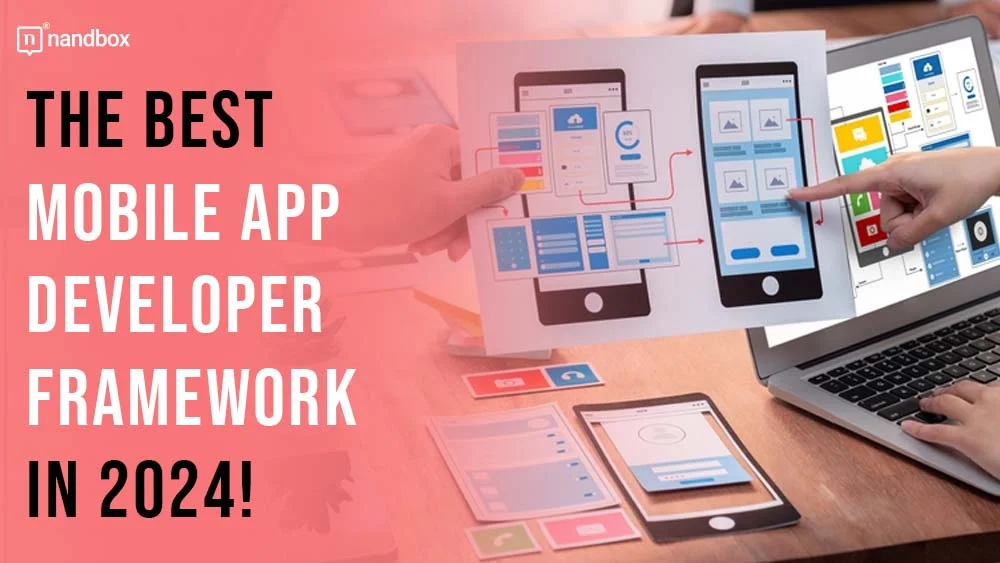Unveiling the Top Mobile App Developer of 2024: Frameworks of Innovation!
Mobile applications are storming in with a force that no one can catch or grasp. Yes, I am referring to Olivia Rodrigo’s Can’t Catch Me Now. Leaving powerful songs that chill us aside, mobile apps are conquering the market. That is, because they’re helping us streamline our daily tasks. Also, they are helping us achieve new accomplishments with simple finger taps. This guide aims to focus the spotlight on the top mobile app developer frameworks of 2024!
Highlighting the secret ingredient of mobile app development through understanding the power that frameworks provide us with. It’s a bird; it’s a plane; no, it is not Superman, but rather a very powerful alternative in the world of app making; it is actually a framework. Dive head-in with us in this guide to learn all there is to learn about frameworks and their importance.
The Best Mobile App Developer: What Are Frameworks? A Quick Overview
Frameworks are organized collections of pre-existing code. Codes that were brought into existence with the purpose of accelerating the process of developing software. Developers are provided with various things. Such as reusable modules, methods, and tools by these large libraries. These tools significantly reduce the amount of time and effort. Ones that are required to construct powerful applications. Instead of beginning each project from scratch, frameworks allow developers to concentrate on adding unique features and addressing specific business challenges.
This is accomplished by encapsulating typical functionalities and design patterns. Frameworks also allow developers to better address specific business challenges. When it comes to development projects, frameworks often adhere to known coding standards and ideal approaches. This encourages consistency, expandability, and ease of maintenance. They provide support for a wide number of programming languages and platforms, and they cover a wide range of domains, including software engineering, mobile app development, and web development, among others.
UI Frameworks for the front end, such as React.js and Angular.js, and frameworks for the back end, such as Django and Express.js, are indispensable tools for developers. These frameworks encourage productivity, collaboration, and innovation in the ever-evolving area of software engineering.
The Three Classifications of Mobile App Frameworks
There are three classifications of mobile app frameworks:
- Native (Android and iOS): Software that is platform-specific and uses native languages and tools.
- Cross-Platform (Xamarin, React Native, and Flutter): One codebase that can be used across numerous platforms.
- Hybrid (PhoneGap, Ionic, Sencha): Combines web technologies with native development.
These three classifications are the foundation of app development. Through them, you can build different apps that function seamlessly. Apps that can save time and help users with many tasks like shopping, bill payment, and ticket booking. Below, we will list for you the top frameworks that will help you develop the app of your dreams.
Flutter: A Tool For Compiled Applications
Flutter is a software development kit (SDK) for user interfaces. Google was the one who conceptualized and created it. Flutter became famous for its ability to construct applications for mobile, web, and desktop platforms with a single codebase. Through the utilization of the Dart programming language, Flutter gives developers the ability to create applications that are not only high-performing but also visually beautiful and include user interfaces that are both expressive and adaptive. The feature known as “hot reload” makes quick iteration and experimentation easier, which ultimately results in the development workflow being organized more efficiently.
By utilizing the architectural design of Flutter, which is based on widgets, developers are able to effortlessly construct one-of-a-kind user interfaces, animations, and interactions, thereby ensuring a seamless user experience across all platforms. With the help of its expanding community support, extensive documentation, and cross-platform features, Flutter has evolved into a framework that is both adaptable and powerful, making it ideal for the development of modern user apps.
The Best Mobile App Developer: React Native
React Native is a flexible framework that Facebook created to let developers create mobile apps using JavaScript and React. By using React Native, developers have the ability to create mobile experiences that closely resemble native apps on both iOS and Android devices, all from one codebase. This framework enables quick development cycles.
Additionally, it enables real-time updates with hot reloading and a component-based architecture similar to React.js, promoting code reuse and efficient development. Rendering components directly to native APIs in React Native guarantees top performance and a genuine native appearance for mobile apps. React Native continues to be a popular choice for developing top-notch mobile applications due to its strong community support, wide range of components, and smooth compatibility with external plugins. Moreover, you can explore proven strategies to effectively monetize your app, including the use of no-code AI, to boost revenue and turn your idea into a profitable venture.”
Next on Our List: Swift UI
Apple developed SwiftUI, a user interface framework, to help developers create intuitive and aesthetically pleasing applications for various platforms. Such as iOS, macOS, watchOS, and tvOS. Introduced in 2019, SwiftUI transforms the process of creating user interfaces for developers by allowing them to specify the UI’s structure and behavior using succinct and expressive syntax.
By utilizing Swift’s robust capabilities, SwiftUI utilizes a declarative method, allowing developers to define the desired UI appearance and behavior without getting bogged down in the details of handling views and states manually. Developers can effortlessly design intricate layouts, animations, and interactions with SwiftUI, utilizing intuitive and reusable components to streamline development and improve code readability.
Furthermore, SwiftUI smoothly integrates with current Swift codebases and UIKit, enabling developers to gradually incorporate it or utilize it in conjunction with traditional UI frameworks. With its responsive features and real-time previews, developers can quickly prototype and iterate to create engaging user experiences effortlessly and efficiently.
Ionic: An Open-Source Framework

With web tools like HTML, CSS, and JavaScript, you can use Ionic, an open-source framework for making cross-platform mobile apps. It offers a complete set of tools and services that make the development process easier. This lets developers make high-performance mobile apps that work like native apps on iOS, Android, and progressive web apps (PWAs). Ionic’s large library of UI components, pre-designed elements, and styles is one of its best features.
It makes it easy for developers to make responsive user interfaces that look good. Ionic also works well with well-known front-end frameworks like Angular, React, and Vue.js, which makes it even more flexible and easy to use. Ionic is a popular choice for startups, businesses, and individual developers who want to make modern, cross-platform mobile solutions. It has built-in features for native device access, offline functionality, and app deployment, which lets developers make feature-rich mobile apps quickly and easily.
Xamarin: A Microsoft Open-Source Framework
Xamarin, under the stewardship of Microsoft, stands as a dynamic open-source framework engineered to facilitate the creation of native, high-performing applications across a spectrum of platforms, including Android, iOS, macOS, tvOS, and watchOS. By harnessing the power of .NET and C# programming languages, Xamarin empowers businesses to deliver unparalleled native performance and immersive user experiences to their audiences.
With this advanced framework, developers can create ecosystems that work together, complete with APIs, back-end integrations, and components.
Additionally, a vibrant and active community supports a wide variety of tools, libraries, and computer languages that they can use. Developers can speed up innovation, make development easier, and make their visions for cutting-edge, cross-platform apps that work on a wide range of devices and operating systems come true with Xamarin’s rich set of features and collaborative environment.
Corona SDK: A Cross-Platform Mobile App Development Framework
Corona SDK, which is now called Solar2D, is a strong cross-platform system for making games and apps for mobile devices. It makes the development process easier and gives them powerful tools to make experiences that are both interactive and beautiful to look at on a number of devices, such as iOS, Android, and even desktop OSes like Windows and macOS. One great thing about the Corona SDK is how simple and easy it is to use.
This makes it a great choice for both new and experienced coders. Corona SDK is based on the Lua scripting language and has a large set of pre-built modules and plugins that make development go quickly. This lets developers focus on being creative instead of worrying about how to code.
Its real-time model also allows for testing and making changes quickly, which speeds up the development cycle. Corona SDK makes it easy for developers to make their ideas come to life, whether they’re making 2D games, educational apps, or business apps. This is why it’s a popular choice among mobile app and game makers.
Wrapping It Up!
To wrap this up, by giving developers more effective tools, easier processes, and more productivity, mobile app frameworks have changed the software development game. With support for both front- and back-end development, these frameworks provide a wide range of options to meet the specific needs of each given project.
If you wish to create your own app, nandbox’s native no-code app builder has got your back. You can now leverage the ease of navigation that we provide you with to your advantage. You can create seamless native apps without having any coding or programming experience or prior knowledge. Sign up now and breathe life into your app idea!





